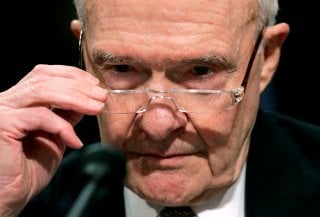A Tribute To Brent Scowcroft
Brent Scowcroft, who has died at age ninety-five, was one of America’s leading statesmen.
Some of this caution was rooted in apprehensions about Russian president Boris Yeltsin, whom Scowcroft referred to in private conversations with British prime minister John Major in August 1991 as “an egoist, a demagogue, an opportunist, and a grandstander.” Bush came under criticism at the time for reacting too slowly to changes taking place in Russia. Scowcroft, however, worried about the possibility of bloodshed and the command and control of the Soviet nuclear arsenal. Secretary of Defense Dick Cheney had a different view. He maintained that the United States should encourage independence movements in the disparate Soviet republics and establish diplomatic relations with them.
Scowcroft pursued a more nuanced policy. He exploited Soviet decline during the Gulf War. He kept Moscow on board while resisting Soviet diplomatic attempts to obstruct a U.S. attack. But after the formal dissolution of the Soviet empire, Bush conspicuously refused to gloat over its demise. To their immense credit, Bush, Scowcroft and Secretary of State James Baker helped to unify Germany and end the Cold War—all without firing a shot. It’s an accomplishment that is only beginning to receive its proper recognition.
The fourth lesson of Scowcroft’s career centers on the paramount goal of maintaining stability in the post–Cold War era. When it came to Iraq, the George H. W. Bush administration deployed a combination of diplomacy and military power to extrude Saddam Hussein from Kuwait in 1991. But it also refrained from entering Baghdad for fear of the unpredictable consequences that might follow. Scowcroft never deviated from this stance, which is why an op-ed under his name appeared on August 15, 2002, in the Wall Street Journal headlined “Don’t Attack Saddam.” Just as Scowcroft had concluded that the Soviet Union lacked true missionary zeal, so he argued that Saddam Hussein was, at bottom, a “power-hungry survivor” who would not operate in tandem with Al Qaeda. Instead, he wrote that toppling Saddam would “swell the ranks of the terrorists” and might “destabilize Arab regimes in the region.” Scowcroft had it right.
His essay, though, infuriated the George W. Bush administration. As Sparrow notes, in some ways Scowcroft’s essay seemed wildly out of character—“it rejected the war plans being formulated by President George W. Bush, who was the son of Scowcroft’s close friend and former boss and who had himself appointed Scowcroft as the chairman of the President’s Foreign Intelligence Advisory Board.” It also took issue with his friend Dick Cheney, by then the vice president, and his protégé Condoleezza Rice, the national-security adviser.
The fifth lesson that Scowcroft provides centers on his actions after he made his reservations about the impending war plain. He didn’t seek to become a permanent thorn in the side of the administration. It was never personal for Scowcroft. It was about policy. Scowcroft went on to fortify his ties with the administration after the war went south. In August 2003, he wrote an op-ed in the Washington Post stating that America had “no choice but to succeed” in Iraq. He testified in February 2007 on its behalf to defend the proposed troop surge. After Barack Obama was elected in 2008, Scowcroft advised him as well on an informal basis. “These twists and turns,” says Sparrow, “reflect the unique role that Brent Scowcroft has occupied as arguably the United States’ leading foreign policy strategist of the last forty years.”
It also reflects his role as an establishment figure beyond mere partisanship. Scowcroft has not subordinated America’s interests to political point scoring. Instead, he has over the decades steadfastly adhered to a broader conception of the national interest, whether the issue is relations with China, Russia or Iran. Throughout, Scowcroft’s advice never varies. It’s calm, sober and judicious. He helped establish a firm foundation for his successors. That they flouted his advice was not his fault. Rice told Scowcroft at a dinner party, “No one told me Iraq would be so difficult.” “Yes, they did,” he replied, “but you weren’t listening.” It’s a mistake that no presidential candidate should want to replicate in 2016.
Jacob Heilbrunn is editor of The National Interest.
Image: Reuters.

